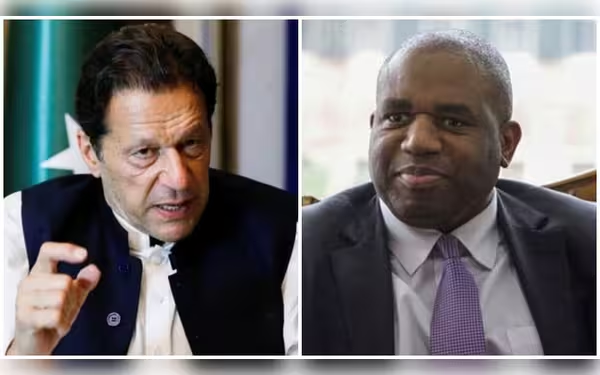Sunday, November 24, 2024 02:54 AM
UK Confirms No Military Trial for Imran Khan
- UK officials monitor Imran Khan's legal situation closely.
- Concerns raised over Pakistan's judicial independence.
- Freedom of expression is vital for democracy.
 Image Credits: thenews
Image Credits: thenewsUK Foreign Secretary David Lammy states no military trial for Imran Khan, emphasizing judicial independence and human rights in Pakistan.
LONDON: The situation surrounding former Prime Minister Imran Khan has garnered significant attention, particularly regarding the potential for his trial in a military court. Recently, British Foreign Secretary David Lammy addressed these concerns, emphasizing that "Pakistan's judicial processes are a domestic matter." This statement came in response to a letter from Kim Johnson MP, which was initiated at the request of Zulfi Bukhari, Khan's adviser on international affairs.
In his remarks, Lammy highlighted that there are currently no indications from Pakistani authorities that they plan to try Imran Khan in a military court. He stated, "We have no recent indications from the Pakistani authorities that they intend to try Imran Khan in a military court, but my officials continue to monitor the situation closely." This assurance is crucial, as military courts often lack the transparency and independent scrutiny necessary to ensure compliance with international standards.
Bukhari had previously organized a letter signed by 20 Members of Parliament from various parties, expressing their concerns about the changes in Pakistan's judiciary and the implications of the 26th Amendment. Lammy reiterated the importance of adhering to international obligations, stating, "The Pakistani authorities need to act in line with their international obligations and with respect for fundamental freedoms, including the right to a fair trial, due process, and humane detention. This applies to Imran Khan as it does to all Pakistan's citizens."
Moreover, Lammy expressed his concerns regarding restrictions on freedom of expression and assembly, particularly in relation to political opposition. He noted, "The freedom to hold and express views without censorship, intimidation, or unnecessary restriction is a cornerstone in a democracy." This sentiment underscores the importance of civil liberties in maintaining a healthy democratic environment.
In light of the recent constitutional amendments passed by Pakistan's parliament, Lammy acknowledged that while such changes are a matter for Pakistan, an independent judiciary is essential for a functioning democracy. He stated, "We have been clear that an independent judiciary, able to check and balance other state organs, is critical to a functioning democracy." The UK government remains committed to working with Pakistan on shared interests, emphasizing the need for a robust legal framework.
Welcoming the response from Lammy, Bukhari expressed gratitude on behalf of the people of Pakistan. He stated, "Once again on behalf of the people of Pakistan, I would like to thank Kim Johnson MP and all the other honourable members of Parliament & the House of Lords who signed the letter raising grave concerns about Imran Khan's illegal incarceration and the lack of human rights currently in Pakistan." Bukhari further criticized the current government, describing it as "tyrannical" and highlighting the struggles of Pakistanis for free and fair elections.
The ongoing dialogue between UK officials and Pakistani authorities reflects a broader concern for human rights and democratic principles. As the situation evolves, it is crucial for the international community to remain vigilant and supportive of the fundamental rights of all citizens, including the right to a fair trial and freedom of expression. The future of democracy in Pakistan hinges on these principles, and the voices of its people must be heard and respected.













